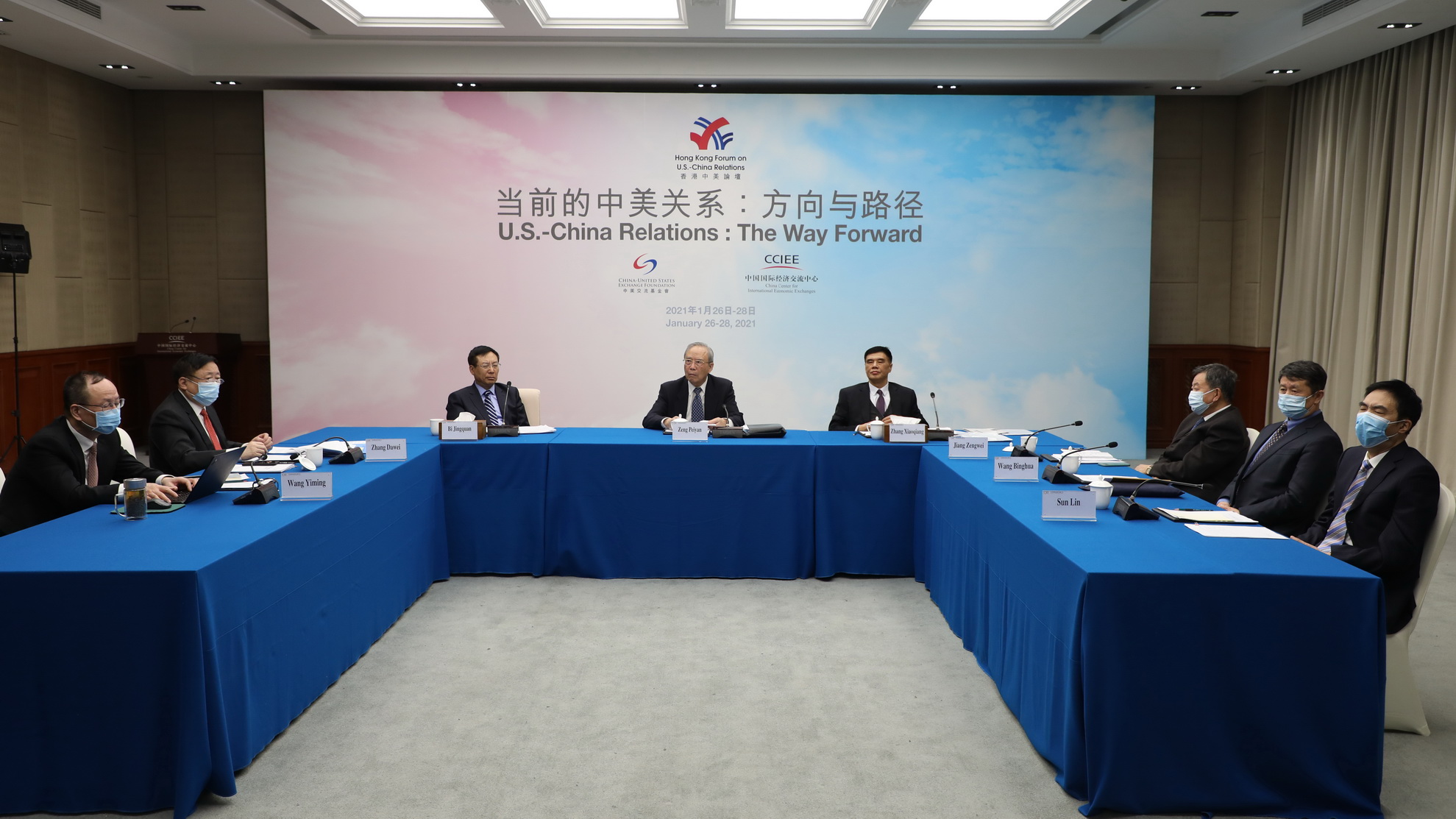CCIEE and the China-U.S. Exchange Foundation Co-organized Online Forum on “China-U.S. Relations: The Way Forward”
- Time:2021-01-28
- source:CCIEE
From January 26 to 28, 2021, the Hong Kong Forum “China-U.S. Relations: The Way Forward” was held online. Participants exchanged their views on the Challenges and Prospects of the China-U.S. Relation, covering such topics as trade and economics, technology and global challenges, and cultural exchanges. The Chief Executive of the Hong Kong Special Administrative Region, Carrie Lam delivered a welcome speech, Zeng Peiyan, Chairman of the China Center for International Economic Exchanges(CCIEE), Jean Chretien, former Prime Minister of Canada, Romano Prodi, former Prime Minister of Italy and former President of the European Commission, and Yasuo Fukuda, former Prime Minister of Japan, Carlos Gutierrez, former U.S. Secretary of Commerce, Kara Hills, former U.S. Trade Representative, Tung Jianhua, Vice Chairman of the 13th National Committee of the Chinese People’s Political Consultative Conference and Chairman of the China-US Exchange Foundation, delivered keynote speeches respectively. More than 40 representatives from the United States, Canada, Japan, Singapore and other countries participated in the forum, including former senior government officials, business leaders and well-known scholars.

The Chinese representatives believe that the unprecedented COVID-19 pandemic has had a significant impact on mankind and the global economy since 2020. In recent years, the China-U.S. relations have fallen into an unprecedented predicament. An important reason is that the United States has strategic doubts and anxieties about China, and believes that a rising China will inevitably become a threat, and the two countries will inevitably fall into the “Thucydides trap”. It is completely wrong to handle the China-U.S. relations with this kind of Cold War mentality and ideological prejudice, and the consequences can be very dangerous. China has always tried to seek common ground while reserving differences and respect the development paths of other countries. Different social systems can coexist peacefully and make progress together. With the development of technological innovation and economic globalization, the zero-sum game has been replaced by win-win cooperation, and war has been replaced by rules-based international economic competition and cooperation. China’s President Xi Jinping proposed a major initiative to build a common community with a shared future for mankind, which conforms to the characteristics and objective laws of the development of international relations. China and the United States should build a relationship based on coordination, cooperation and stability. China is a participant and contributor to the existing international order, not a challenger and disruptor. What China’s development brings to the world is not a threat but an opportunity.
The Chinese representatives hope that President Biden’s administration will adjust its thinking and behaviors, enhance mutual trust, and build a China-U.S. relationship based on the principles of non-confrontation, mutual respect and win-win cooperation. First of all, the two sides should increase mutual trust by restarting and improving the multi-level exchange mechanisms, resume strategic dialogues between the high-level leaders. Dialogues should become the basic channel to resolve problems. Furthermore, they should actively carry out the “second track” dialogues between non-governmental organizations, enterprises and think tanks in the fields of education, science and technology, and culture, so as to enhance mutual understanding and improve the public opinion of the two countries. Secondly, they should consolidate mutual trust by reshaping the China-U.S. economic and trade relations. China and the United States should conduct a new round of economic and trade negotiations on the basis of a comprehensive and objective assessment of the first-stage economic and trade agreement, eliminate high tariffs imposed on each other as soon as possible, remove unreasonable investment restrictions, restart the BIT negotiations and bring the China-U.S. economic and trade relations back on track. Lastly, the two countries should deepen mutual trust through global governance cooperation. As the world’s top two economies, China and the United States both shoulder common responsibilities in areas such as pandemic prevention and control, stabilizing the world economy, addressing climate change, poverty eradication, food security, cybersecurity, counter-terrorism, and non-nuclear proliferation. They should strengthen coordination, build a framework for cooperation, and work with other countries to resolve pressing global issues and major challenges facing mankind.
The U.S. representative believes that the U.S.-China relationship is one of the most important bilateral relations in the world today. The two countries have extensive common interests such as maintaining world peace, stability, prosperity and development. They should treat the bilateral relationship from a strategic and long-term perspective, respect each other’s core interests and major concerns, strengthen dialogue, exchanges and cooperation, and properly handle differences. The China-U.S. relations can embark on a path of non-conflict, non-confrontation, mutual respect, win-win cooperation, and peaceful coexistence. The two countries have huge room for cooperation in areas such as fighting pandemic, economic and trade recovery, and technological innovation.
The online forum on “The China-U.S. Relations: The Way Forward” was jointly organized by the China Center for International Economic Exchanges and the China-U.S. Exchange Foundation. An offline forum was held in Hong Kong in 2019 under the theme of “China-U.S. Economic and Trade Relations: Status Quo and Prospects”.
